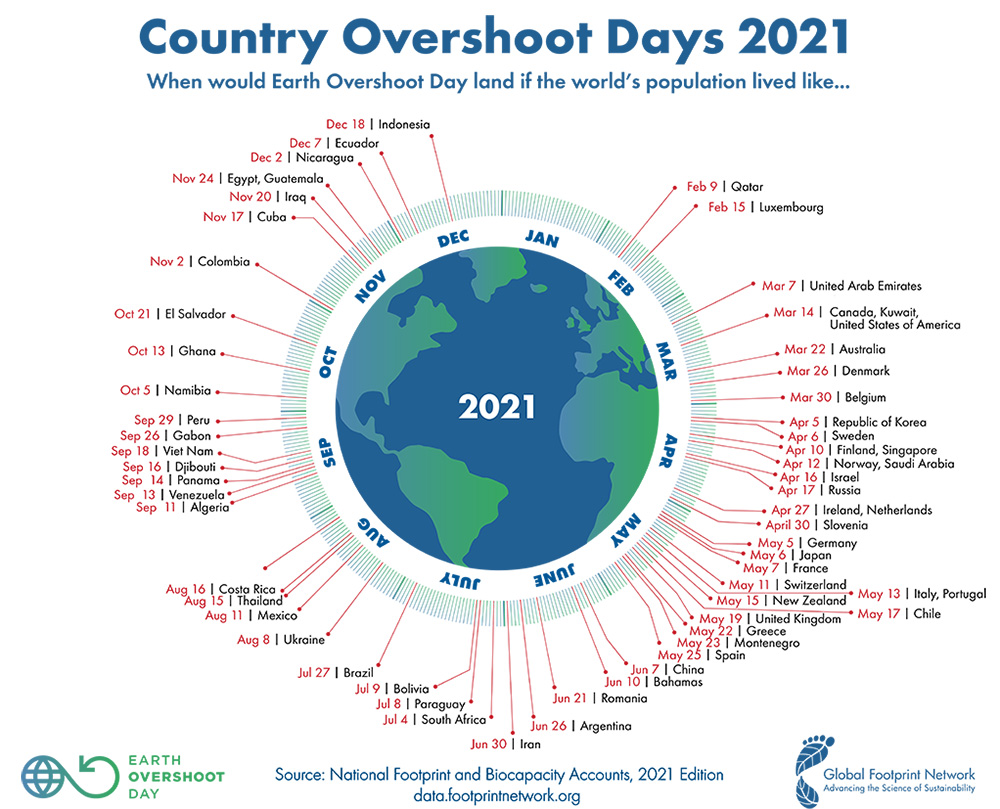
It is entirely appropriate that President Biden launches his global climate summit on Earth Day 2021. Earth Day began in the US in 1970, triggered by massive pollution across the country, and the need to fundamentally change concepts of industrial development if society was to prosper, rapidly leading by the end of 1970, to the creation of the US Environmental Protection Agency, with bipartisan political support.
Similar, but longer term concerns, resulted in the publication in 1972 of the “Limits to Growth” (LtG) report by the Club of Rome, a group of scientists and businessmen whose specific focus was on the “Predicament of Mankind”: the implications of exponential growth in both population and consumption within a finite world. It concluded:
- If the present growth trends in world population, industrialisation, pollution, food production and resource depletion continue unchanged, the limits to growth on this planet will be reached sometime in the next one hundred years. The most probable result will be a rather sudden and uncontrolled decline in both population and industrial capacity.
- It is possible to alter these growth trends and to establish a condition of ecological and economic stability that is sustainable far into the future. The state of global equilibrium could be designed so that the basic material needs of each person on Earth are satisfied and each person has an equal opportunity to realise his individual human potential.
- If the world’s people decide to strive for this second outcome rather than the first, the sooner they begin working to attain it, the greater will be their chances of success.
A further insight was that as a limit is approached, societies would initially spend a great deal of time discussing it whilst expansion continued, thus leading to overshoot before collapse.
The report comprised twelve scenarios for the future, as perceived in 1972. Recent analysis has shown that the “standard run” scenario has been remarkably close to reality as it evolved over the intervening fifty years. The problem is that around about now, that scenario suggested the global system would break down, something that is increasingly evident, largely as a result of climate change impacts, biodiversity loss and resource depletion.
Initially, both the “Earth Day” and “Limits to Growth” warnings were received positively, but acrimony then set in, with conservatives in particular seeing them as a threat to the established order. The result is that the warnings were totally ignored as neoliberal ideology gained ascendancy under both democratic and authoritarian political systems, and unconstrained, supposedly free markets became the dominant economic paradigm. Today, human civilisation is under immediate threat from the problems these markets have created, such as climate change, and which they cannot solve.
Energy is the driver of our economic prosperity. To date that has meant fossil fuels, with the attendant carbon emissions and climate change. Little wonder that countries with the greatest abundance of, and reliance upon, fossil fuels emerged as the greatest opponents to any idea of “limits”, particularly where their fossil fuel industries had accrued sufficient power to dominate domestic politics, as in Australia.
Hence the UN climate negotiations over the last three decades, as the LtG envisaged, have achieved precisely nothing in terms of the key priority, which is carbon emission reductions. Emissions continue to rise in line with worst case scenarios, largely due to the denial and deliberate undermining of serious climate action by the fossil fuel lobby, so we are now well into overshoot.
The Biden Summit is a crunch point. The US in recent years, particularly under Trump, has been a major impediment to such action, but even before Trump was in thrall to climate denialist conservatives. Whether Biden can break through these barriers remains to be seen, albeit initial indications are encouraging.
However, the challenge is far greater than even the Biden Administration has been prepared to admit. The latest science makes it clear that the currently fashionable target of achieving net zero emissions by 2050, in the process supposedly meeting the Paris Climate Agreement objectives of keeping temperature increase below 2oC and ideally toward 1.5oC, is totally inadequate. 1.5oC is already locked in before 2030, and to avoid the threat of triggering irreversible, self-sustaining warming beyond human influence, net zero emissions will have to be reached far sooner, ideally by 2030. The Biden Summit must start a conversation around these realities, and the emergency response required, otherwise the world will have only moved from the hard climate denial of the last three decades, to soft denial – pretending that we now understand the climate threat, but yet again doing nothing of substance to address it.
Where is Australia placed?
Australia used to pride itself, justifiably, as a leader in so many areas, whether medicine, science, engineering, diplomacy, social innovation and politics, punching far above its weight in global affairs. Over the last three decades, under the growing influence of neoliberalism, conservative media and the fossil fuel lobby, our values have slipped dramatically, to the point that we have become little more than greedy free-riders, primarily intent on peddling our fossil fuels to the world, irrespective of the consequences for humanity.
John Howard started this decline in 1997, demanding special treatment in the form of the Australia Clause, as our price to sign up to the Kyoto Protocol. That clause allowed Australia to increase emissions disproportionately when almost everyone else committed to a reduction. Today, the free-rider mentality pervades every element of our inadequate climate and energy policies, which are shot through with inconsistencies:
First, Australian leaders, whether in politics, business or finance, ignore or prefer not to understand, the implications of climate change science, and hence the real risks and uncertainties we face. It is as if the drought, the bushfires, the pandemic and floods, all of which were climate-related, never occurred. We reacted well in recovering from them, but were totally unprepared despite the fact they had long been predicted. Such events will escalate as climate impacts worsen, yet there is no mention of mitigating the threat, only inadequate adaptation.
Second, the Federal government will not commit to any net zero emission target date, so we have an open-ended Technology Roadmap with no emission reduction time frame. The technologies may well be valuable components of the climate solution, but only if they are prioritised to meet a specific target date – the action required to meet net zero by 2030 will be totally different from that for 2050.
Third, without debate the government commits to a gas-led recovery which increases fossil use, domestically and for export, when there is no carbon budget left to stay below both 1.5 and 2.0oC on any realistic risk management basis. Emissions should be reducing rapidly, not increasing.
Fourth, the government maintains the solution is “technology not taxes”, “taxes” meaning carbon pricing. Carbon pricing is not a tax, but the removal of the enormous subsidy the fossil fuel industry has enjoyed for decades, by not accounting for the external damage arising from its activities. For example the cost of the bushfires, floods and health impacts which can fairly be attributed to fossil fuel use via climate change, recently estimated at around A$38 billion annually, more than Australia spends on defence. So the government massively subsidises fossil fuels, criticises any assistance given to the renewable industries, and makes the community to carry the cost of the damage resulting from this subterfuge. Likewise, carbon capture and storage is unlikely to be workable without carbon pricing, and in any event is technically difficult unless using depleted oil and gas reservoirs, of which few exist close to emission sources. Yet the government insists it is a key element of the Technology Roadmap
Fifth, whilst some States are taking serious climate action, it is compromised by short sighted politics. In NSW, Minister Kean’s welcome initiatives to accelerate the transition to a low carbon economy are more than negated by the long list of new coal mining projects being promoted by his government and the fossil fuel industry. The justification apparently being that we should continue selling fossil fuels to the world until the markets dry up. Likewise with LNG exports from Queensland and WA. The ultimate free-ride, devoid of any moral or ethical responsibility, not just to humanity but to our own community.
Sixth, every institution involved in climate and energy policy within the Federal orbit is stacked with ex-fossil fuel lobbyists, from the Prime Minister’s office down. But as Albert Einstein observed: “the problem will not be solved with the same thinking which created it”.
Seventh, it is clear from recent ALP policy statements and the Upper Hunter by-election that, with a few exceptions, both sides of politics still regard climate change as just another item on the political agenda to be boxed and diced for electoral advantage. Which it most decidedly is not. Climate change is now an immediate existential threat to the Australian community, and to civilisation as we know it.
As such, it should be above politics. The first priority of any government is the security of the people, but both Government and Opposition are failing abysmally in that primary responsibility. The only explanation for our totally dysfunctional policies is that, astonishingly in 2021, a large proportion of our political leaders still do not believe the climate threat is real. In short, our leaders are not fit for purpose
Addressing the real climate challenge requires leadership unlike anything on display in Australia today. The Biden Summit provides an opportunity for such leadership to emerge at the global level, which should dismiss the current Australian policy charade for the self-serving denialism it is.
Perhaps international pressure might force leadership change in Australia, but it is most likely up to the Australian community to reflect upon the long-neglected messages of Earth Day and the Limits to Growth and pick leaders suitable for the times – sooner rather than later.
This article was published in Pearls & Irritations on 25th April 2021
